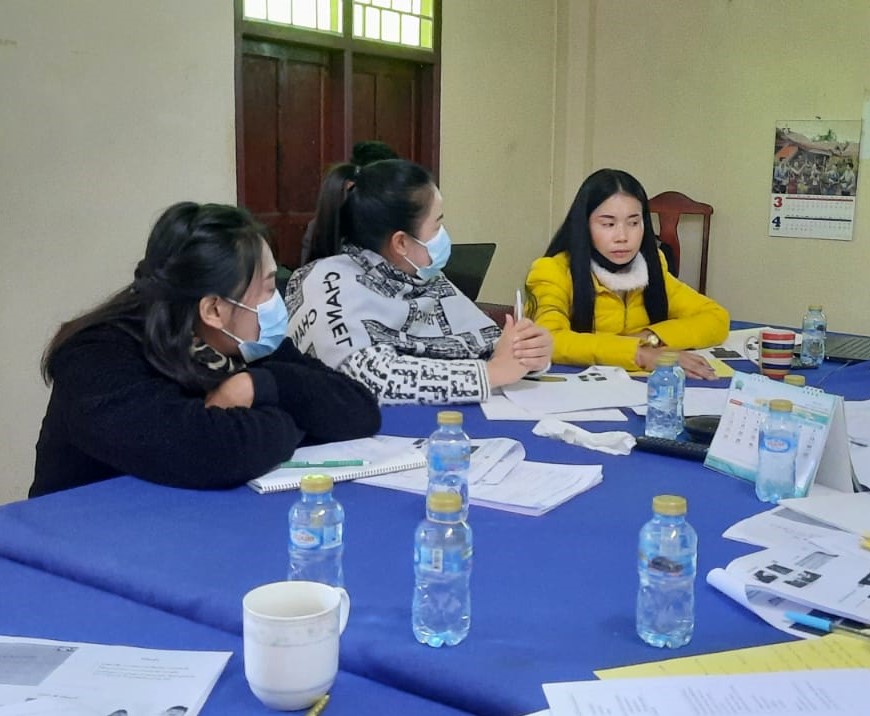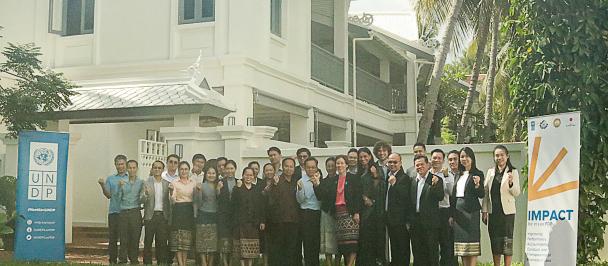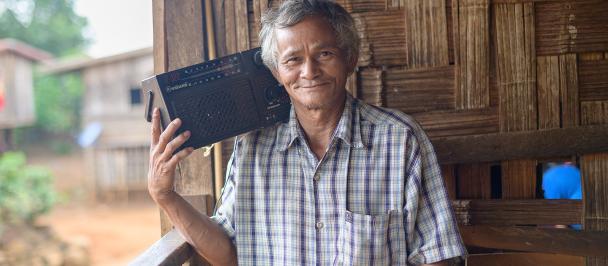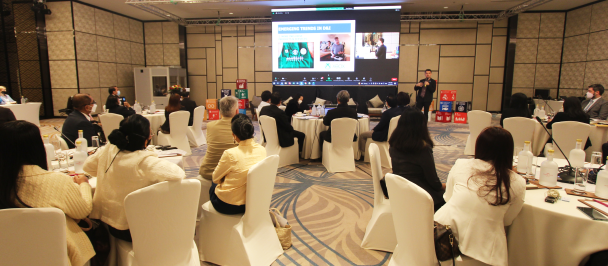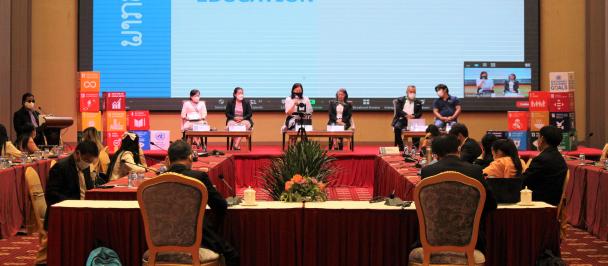ສຳລັບບົດພາສາລາວ For Lao Version
Community radio volunteers at Houn district discussed gender norms during the training.
In the central Laos district of Nakai, renowned for its lush forests and rich biodiversity, 26-year-old schoolteacher Phan reflects on the remote learning experiences of her students during the COVID-19 pandemic:
“Some of my students are not able to join online learning because they do not have proper devices. Or even if they have one, they are often too distracted to concentrate on learning.”
Like many teachers during the pandemic, Phan has dedicated herself to ensuring that her students are able to continue their learning despite periodic and lengthy school closures. She notes that challenges have been further compounded for those learners who already faced other social vulnerabilities, including those from ethnic and linguistic minorities. Phan, a member of the majority Makong ethnic group in Nakai District, observes:
“Everyone has an equal right to education and development, including ethnic people; however, ethnic people are usually looked down upon, resulting in their feeling unconfident to participate in learning”
A 2021 UNESCO-UNICEF study on the effects of, and responses to COVID-19 on the education sector in Lao PDR underscores the reality of Phan’s experience: that those most impacted by education disruption are the most vulnerable in society. These include residents of rural areas, children with disabilities, ethnic groups and, most prominently, girls and young women like Phan. In her dual role as teacher and volunteer community radio presenter, Phan runs ‘New Day Learning’, a radio programme in Makong language, in which she regularly updates her listeners with news on local educational opportunities. Phan is supported as part of the year-long project ‘Championing girls and women’s education in COVID-19 recovery through community radio in Laos’, which is a collaboration between UNESCO and UNDP, with the Lao Ministry of Information, Culture and Tourism, and the Ministry of Education and Sports.
Phan is among 30 other women volunteering and working in community radio stations receiving support under the project in Nakai District in Khammouane, Houn District in Oudomxay, and Ta-Oi District in Salavan.
The gendered effects and impacts of COVID-19
Societal impacts related to COVID-19 have gendered aspects that are felt across many areas of life. Even before the pandemic, gender norms affected girls’ ability to access education and participate in learning. In Ta-Oi District, 32-year-old community radio volunteer Sisavath shares her thoughts on the potential impacts of parents’ attitudes to education on their daughters’ learning:
“Many parents don’t want to send girls to school, which can happen especially in rural areas. There are examples in the village that while some parents invested in education for their children, after graduation their child did not get a job and, [instead], came back to help the family at farming. Most parents usually think of education as a kind of unprofitable investment that they reckon may not really be worth the money”
Sisavath adds that she wants all parents to realize the fundamental importance of education for all their children, girls and boys alike:
“Everyone should understand the importance of education because education is for everyone regardless of being rich or poor; education will be the important process to create the future leaders for our country”
Under the project, the volunteers set out to identify the different kinds of barriers that girls and young women face in accessing education, including barriers underpinned by harmful gender, cultural or social norms. In a five-day workshop in December facilitated by Plan International, the volunteers reflected on their own experiences in their villages. Social norms around gender and power were explored, particularly the impact these norms have on the education and related opportunities available to girls and young women.
As Phaithanom, a 33-year-old community radio volunteer from Houn District, who is from the Khmu ethnic group, states:
“Some people still believe that a woman does not meet the conditions for being the leader on every management level. But I think women have lots of abilities and potential to be leaders. As we can see [from] many examples, women can be head of the class and can be head of the village…I want to encourage all women to open themselves up to opportunities through education”
Shifting norms and changing attitudes through community radio conversations
Although cultural norms and socially-ingrained attitudes can be barriers to girls’ education, through conversations and awareness-raising in homes and in communities, these can be shifted. As Phaithanom observes, ‘Changing norms is possible, starting with changing our own attitudes’, and these attitude shifts are already visible, as she has witnessed increased women’s representation in schools and in her community. By the end of the workshop, she better understood ‘the roots of a social norm, how we can change it, and who is responsible for this change’.
Back in Ta-Oi District, Sisavath and her community radio project participants are putting into practice various skills they have enhanced through the project, especially in programme production and focusing on shows that set out to tackle these harmful norms. Through the project, and a recent five-day workshop facilitated by the youth-led social enterprise STELLA, community radio volunteers gained knowledge of social norms and practiced how to format key messages in radio broadcasting. The workshop aimed to encourage more gender-equitable education through a wide variety of radio products, including interviews, Vox pop, panel discussions, debates, role playing, and extended storytelling.
Promoting girls’ education supports sustainable recovery from COVID-19
As countries plan their economic recovery from COVID-19, they should recognize the important investment and returns of girls’ education. Communities should be reminded that fewer girls in the classroom means fewer women who can make valuable social and economic contributions to society. When girls excel in their education, society as a whole prospers; indeed, investing in girls’ education has been linked to declines in child marriage, early pregnancy, child and maternal mortality, and child malnutrition.
In Lao PDR, community radio is playing an important role in starting community level conversations about gender, power, and equality. It is working to amplify the voices of girls and women who openly champion their right to education and support a sustainable recovery from the pandemic. Radio programmes led by women that feature messages on the importance of girls’ education and gender equality have been found to positively influence family and community attitudes on gender equality. Phan, Phaithanom and Sisavath are examples of young women leaders who are paving the way as champions of girls’ and women’s education in their communities. We must continue to keep girls ‘in the picture’ in COVID-19 recovery plans by ensuring that all girls are learning and that #LearningNeverStops.
This article is written by:
Jenelle Babb, Regional Advisor on Education for Health and Wellbeing, Inclusive Quality Education Section, Asia and Pacific Regional Bureau for Education, UNESCO Bangkok. Seán O'Connell, Team Leader for Governance, Assistant Resident Representative, United Nations Development Programme, Laos.

 Locations
Locations